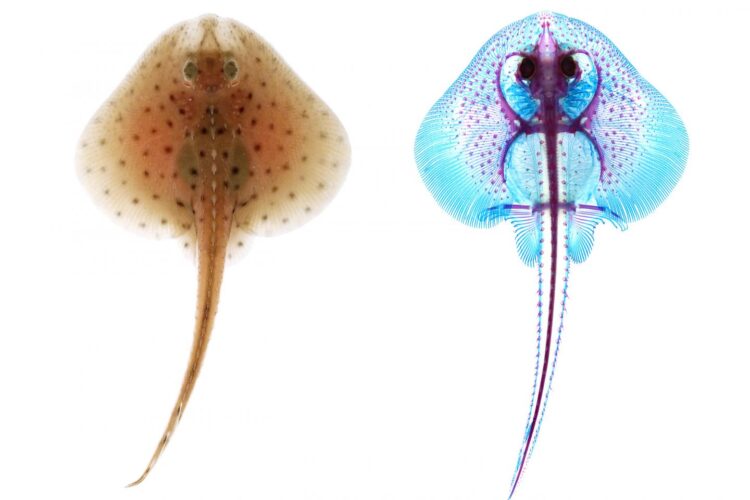
Credit: Andrew Gillis
WOODS HOLE, Mass. — Nearly a quarter of Americans suffer from arthritis, most commonly due to the wear and tear of the cartilage that protects the joints. As we age, or get injured, we have no way to grow new cartilage. Unlike humans and other mammals, the skeletons of sharks, skates, and rays are made entirely of cartilage and they continue to grow that cartilage throughout adulthood.
And new research published this week in eLife finds that adult skates go one step further than cartilage growth: They can also spontaneously repair injured cartilage. This is the first known example of adult cartilage repair in a research organism. The team also found that newly healed skate cartilage did not form scar tissue.
“Skates and humans use a lot of the same genes to make cartilage. Conceivably, if skates are able to make cartilage as adults, we should be able to also,” says Andrew Gillis, senior author on the study and a Marine Biological Laboratory Whitman Center Scientist from the University of Cambridge, U.K.
The researchers carried out a series of experiments on little skates (Leucoraja erinacea) and found that adult skates have a specialized type of progenitor cell to create new cartilage. They were able to label these cells, trace their descendants, and show that they give rise to new cartilage in an adult skeleton.
Why is this important? There are few therapies for repairing cartilage in humans and those that exist have severe limitations. As humans develop, almost all of our cartilage eventually turns into bone. The stem cell therapies used in cartilage repair face the same issue–the cells often continue to differentiate until they become bone. They do not stop as cartilage. But in skates, the stem cells do not create cartilage as a steppingstone; it is the end result.
“We’re looking at the genetics of how they make cartilage, not as an intermediate point on the way to bone, but as a final product,” says Gillis.
The research is in its early stages, but Gillis and his team hope that by understanding what genes are active in adult skates during cartilage repair, they could better understand how to stop human stem-cell therapies from differentiating to bone.
Note: There is no scientific evidence that “shark cartilage tablets” currently marketed as supplements confer any health benefits, including relief of joint pain.
###
The Marine Biological Laboratory (MBL) is dedicated to scientific discovery – exploring fundamental biology, understanding marine biodiversity and the environment, and informing the human condition through research and education. Founded in Woods Hole, Massachusetts in 1888, the MBL is a private, nonprofit institution and an affiliate of the University of Chicago.
Media Contact
Diana Kenney
[email protected]
Original Source
https:/
Related Journal Article
http://dx.





